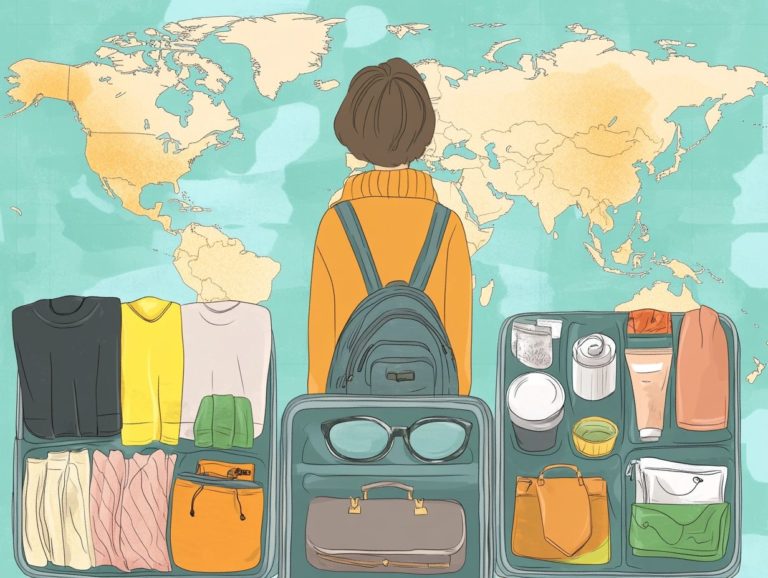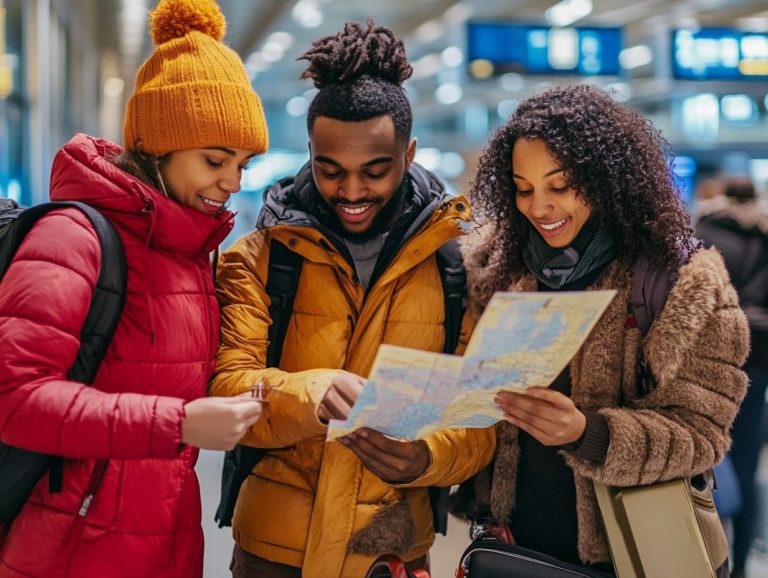What to Do in Case of an Emergency Abroad?
Traveling to new destinations is an exhilarating adventure that can also present unexpected challenges.
Knowing how to prepare for emergencies while abroad can make a significant difference in your experience. This guide outlines essential documents and contact information to keep accessible, common emergencies you might encounter, and practical tips for ensuring your safety.
You ll find insights into locating medical care, navigating legal issues, and accessing emergency resources. Being well-informed empowers you to navigate your journey smoothly, so arm yourself with the knowledge needed to travel with confidence!
Contents
- Key Takeaways:
- Preparing for Travel Emergencies
- Common Emergencies Abroad
- Staying Safe in a Foreign Country
- Tips for Avoiding Dangerous Situations
- Dealing with Medical Emergencies
- Handling Legal Emergencies
- Emergency Resources and Support
- Frequently Asked Questions
- What to Do in Case of an Emergency Abroad?
- What Types of Emergencies Can Happen While Traveling Abroad?
- Do I Need to Have a Plan in Place Before Traveling Abroad?
- What Should I Do If I Get Injured or Sick While Abroad?
- How Can I Prepare for Emergencies Before Traveling Abroad?
- What Should I Do If I Lose My Passport or Other Important Documents While Abroad?
Key Takeaways:
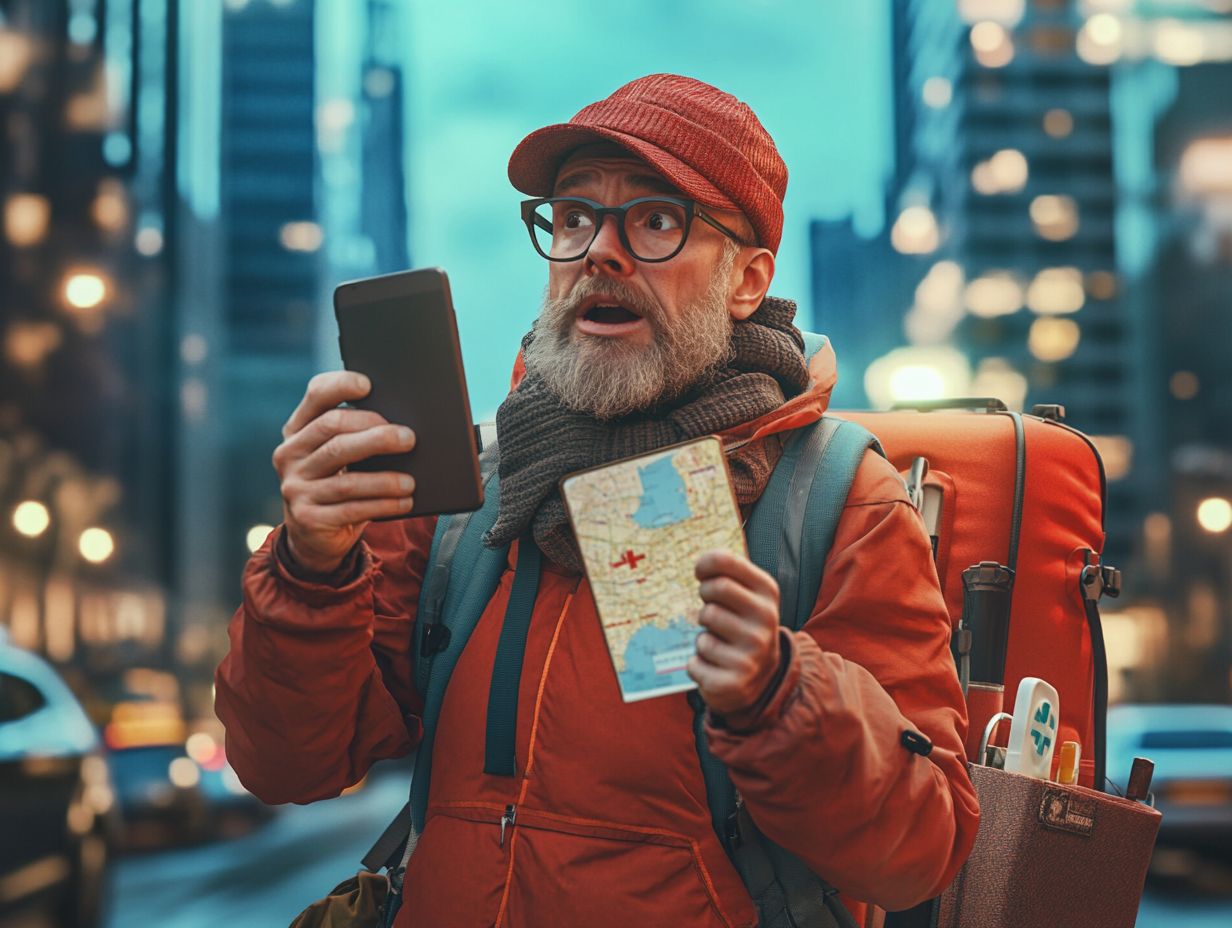
- Keep essential documents and contact information with you at all times while traveling abroad.
- Familiarize yourself with common emergencies and learn how to handle them.
- Stay safe in a foreign country by avoiding dangerous situations and being aware of your surroundings.
Preparing for Travel Emergencies
Preparing for travel emergencies is essential for any savvy traveler venturing into international territory. Given the unpredictable nature of natural disasters, political unrest, and health risks, having a solid emergency preparedness plan can greatly mitigate potential risks. This ensures your personal health and safety.
Focus on key elements like assembling a well-stocked emergency kit, securing comprehensive travel insurance, and staying informed about local emergency services and communication plans. This proactive approach allows you to act quickly during a medical emergency, providing peace of mind as you explore the world.
Essential Documents and Contact Information
Essential documents and contact information are vital for a safe travel experience and should be at the top of your emergency preparedness strategy.
First and foremost, having a valid passport is crucial; it s your primary form of identification while abroad. You ll also want easy access to your travel insurance details, as this coverage can be lifesaving during unexpected situations.
Maintain a list of emergency contacts, including friends and family, along with local embassy information. This way, if you find yourself in a bind, you can quickly reach out for help or legal support.
A well-organized travel document folder can truly make all the difference, giving you peace of mind and allowing for smooth navigation through any challenges that may arise on your journey.
Common Emergencies Abroad
Common emergencies you may encounter can vary widely, including medical crises, natural disasters, and even political unrest. Staying informed can make your travels much safer!
Being prepared ensures your safety and well-being during your travels.
Types of Emergencies and How to Handle Them
Understanding the types of emergencies you might encounter, such as medical emergencies and various health risks, is essential for keeping yourself safe.
From sudden illnesses like food poisoning to accidents requiring immediate medical attention, recognizing these potential hazards is crucial. Issues like allergic reactions or altitude sickness can emerge unexpectedly, so it s important to plan ahead. Knowing how to respond swiftly can lessen their impact.
Familiarize yourself with local healthcare facilities, maintain a list of emergency contacts, and ensure you have adequate travel insurance.
By being prepared and informed, you can navigate these challenges with greater confidence and less stress.
Staying Safe in a Foreign Country
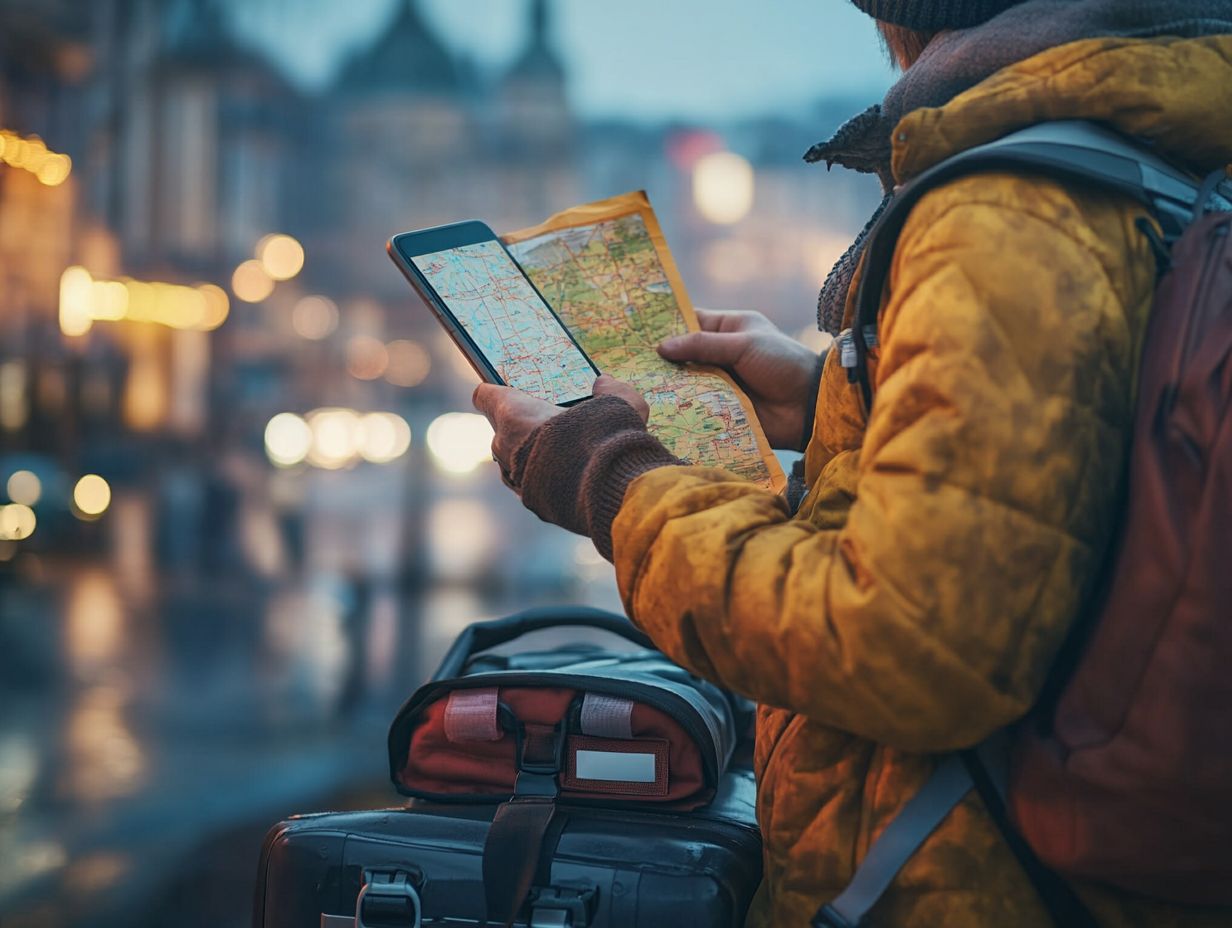
To ensure your safety in a foreign country, it s essential to adopt proactive travel safety measures and follow key safety tips. Doing so can significantly reduce your risk exposure while enhancing your overall experience, allowing you to fully immerse yourself in the adventure ahead.
Tips for Avoiding Dangerous Situations
Implementing safety tips to avoid dangerous situations is essential for any savvy traveler. It ensures a safer and more enjoyable journey through foreign countries.
Having a well-thought-out communication plan can significantly enhance your safety while venturing abroad. Share your travel itineraries with family or friends and make it a point to check in with them regularly.
Understanding local customs and laws can prevent misunderstandings that could lead to unnecessary risks. Being aware of dress codes or local etiquette helps you fly under the radar and avoid potentially awkward encounters.
Stay informed about the latest travel advisories, which are official warnings about safety risks in certain areas. Connecting with other travelers through reliable platforms can provide valuable insights to help protect against unexpected challenges.
Taking a proactive approach transforms your trip into a fulfilling experience rather than a stressful ordeal.
Dealing with Medical Emergencies
Navigating medical emergencies while traveling demands your immediate attention. A clear understanding of available emergency treatment options and robust travel insurance ensures seamless access to necessary care.
Finding Medical Care and Insurance Coverage
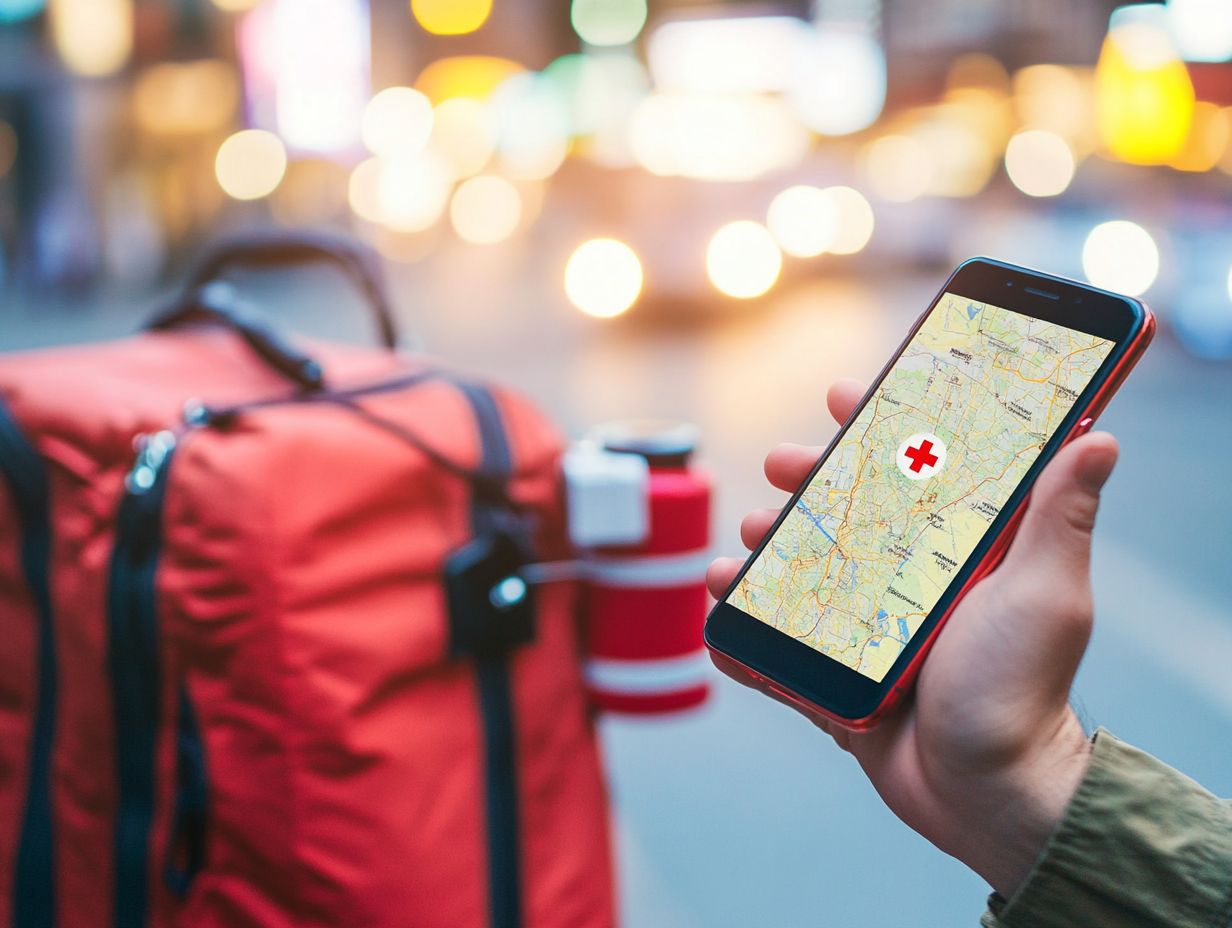
Finding medical care and understanding your insurance coverage are critical steps when facing a medical emergency abroad.
Familiarize yourself with your surroundings and know how to access medical facilities in a foreign country. Consult the local embassy or consulate, which often provides listings of nearby hospitals and clinics.
Check your insurance policy documents beforehand, as many insurance plans have partnerships with specific healthcare providers. Download mobile apps to help you locate urgent care services and translate medical terminology when needed.
Being prepared allows you to navigate health issues with ease. It also keeps you informed about the terms and limitations of your travel insurance saving you time and stress when it matters the most.
Handling Legal Emergencies
Navigating legal emergencies while traveling can feel overwhelming. However, familiarizing yourself with local laws and knowing how to access legal assistance can greatly reduce the stress of these situations.
Understanding Local Laws and Getting Legal Assistance
Understanding local laws is essential for you as a traveler. It helps you avoid potential legal pitfalls and know when it s time to seek legal assistance.
By familiarizing yourself with the specific regulations of your destination, you can prevent misunderstandings and enjoy a smoother travel experience. Each place has its own set of rules regarding behaviors like drinking, driving, or public conduct, which may differ significantly from those in your home country.
Have a list of emergency contacts for local legal assistance. This list should include reputable lawyers, your embassy, and local law enforcement, ensuring you have prompt help if unexpected situations arise.
Being prepared enhances your safety and provides peace of mind throughout your travels.
Emergency Resources and Support
Emergency resources and support systems are invaluable assets for travelers. They offer essential contacts and organizations that can assist you during crises, including local embassies and emergency services.
Having this information at your fingertips makes all the difference when unexpected situations arise. Stay informed and be prepared your safety depends on it!
Organizations and Hotlines to Contact in an Emergency
In times of crisis, knowing which organizations and hotlines to reach out to can be vital for securing assistance for travelers and emergency services.
Familiarize yourself with essential resources, such as the nearest embassy, which plays an important role in providing support during emergencies whether it’s a lost passport or a medical issue. U.S. Department of State’s Overseas Security Advisory Council provides real-time updates on safety alerts. International SOS specializes in medical and security assistance. Local consulates can also be invaluable allies for travelers in distress.
Being informed about these resources ensures you are well-equipped to navigate unexpected situations while away from home!
Frequently Asked Questions
What to Do in Case of an Emergency Abroad?
In an emergency abroad, first, remain calm and assess the situation.
What Types of Emergencies Can Happen While Traveling Abroad?
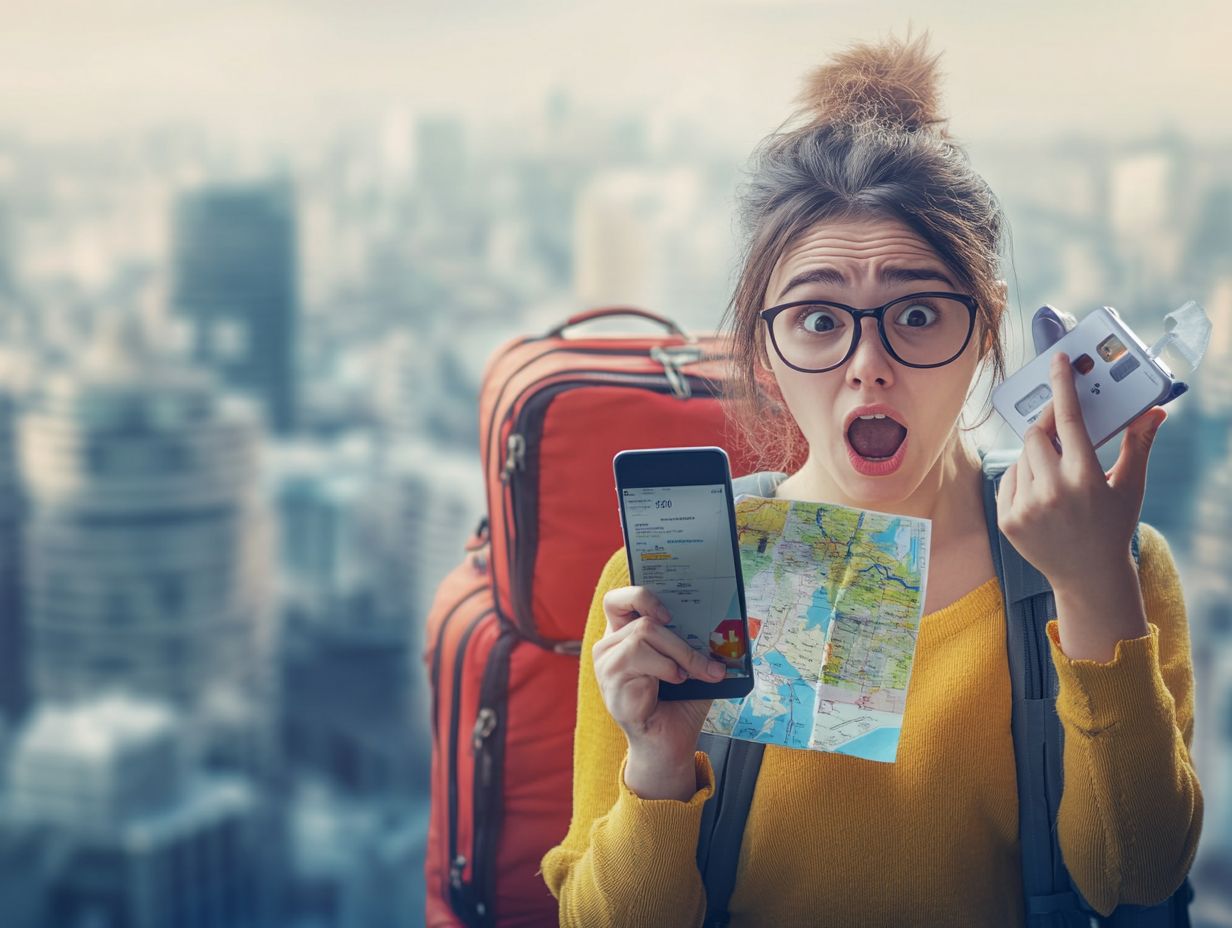
- Natural disasters
- Accidents
- Medical emergencies
- Political unrest
Do I Need to Have a Plan in Place Before Traveling Abroad?
Yes! It’s important to have a plan in place before traveling abroad, such as having travel insurance and knowing the emergency contact information for your embassy or consulate in the destination country.
What Should I Do If I Get Injured or Sick While Abroad?
If you get injured or sick while abroad, seek medical attention immediately. You can also contact your embassy or consulate for assistance and to notify them of your situation.
How Can I Prepare for Emergencies Before Traveling Abroad?
Before traveling abroad, research the destination country and its emergency procedures. Register with your embassy or consulate, and keep a copy of your passport and important documents in a safe place.
What Should I Do If I Lose My Passport or Other Important Documents While Abroad?
If you lose your passport or other important documents while abroad, contact your embassy or consulate for assistance. They can help you obtain a new passport and guide you on any necessary steps to take.
Know these vital contacts before your next adventure to travel worry-free!


